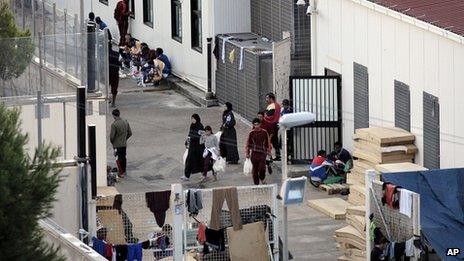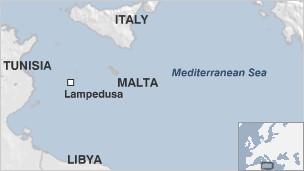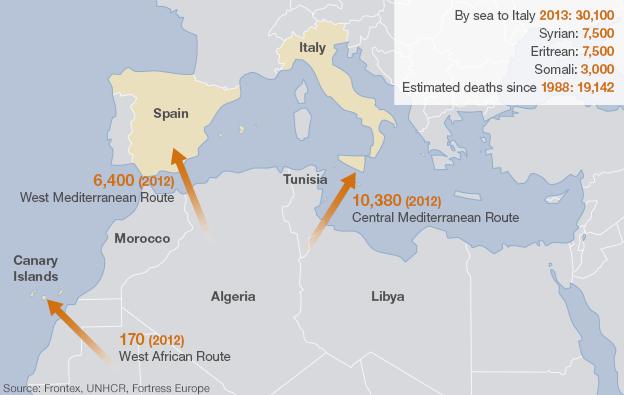Italy steps up migrant boat patrols after tragedies
- Published
Kassim Kayira said many people have gathered to see more than 100 coffins arrive in Sicily
Italy is stepping up sea and air patrols following the deaths of hundreds of migrants sailing in overcrowded boats from North Africa.
Prime Minister Enrico Letta said an "air and naval package" would start on Monday south of Sicily.
On Friday at least 33 people died when their boat capsized between Malta and the Italian island of Lampedusa.
A week earlier, more than 350 migrants died in another shipwreck off Lampedusa in the southern Mediterranean.
Meanwhile, a new boat with 137 migrants reached Lampedusa on Monday, reports said. Most of those on board were believed to be Syrians, according to Reuters news agency.
Separately, more than 200 migrants arrived to Sicily after being rescued by the Italian coastguard and a merchant ship on Sunday.
Italy has previously called for EU help in dealing with the thousands of desperate migrants who wash up on its beaches every year. Many are families fleeing war and poverty in Africa and the Middle East who hope for a better life in Europe.
But the recent loss of life has led to further calls for EU action.
'Huge effort'
Italian Defence Minister Mario Mauro said the country intended to triple its presence in the southern Mediterranean.
It had become necessary "in part by the fact that Libya is currently a 'non-state'," he told Italian newspaper Avvenire.
"We need strong action to stop these shipwrecks," he added.
Italian media reported that unmanned drone aircraft based in Sicily could also be used to identify boats in trouble.
Foreign Minister Emma Bonino said the patrols would be to rescue migrants rather than "telling them to stay where they are".

Lampedusa has set up a temporary camp to house migrants
In addition to coastguard and border police vessels, the Italian navy currently has three ships supported by four helicopters patrolling the area. It can also call on two surveillance aircraft with night-vision capabilities.
A spokesman for the UN refugee agency, UNHCR, in Lampedusa told the BBC that Italy is also planning to increase its capacity for receiving migrants from 8,000 to 16,000.
"[Migrants] should be transferred to the mainland, to the proper reception system. It's a huge effort [Italy] is making... the reception capability will be raised starting from next January," Maurizio Molina said.
Migrants who survived Friday's capsize say they were were shot at as they left Libya.

One survivor told the BBC that some on board were shot and that bullet holes caused the boat to start sinking.
Some have suggested that the Libyan coast guard had fired at the boat, though other accounts suggested that rival trafficking gangs or Libyan militiamen may have been to blame.
Maltese Prime Minister Joseph Muscat visited Libya on Sunday where he discussed the issue of migrant boats with his Libyan counterpart Ali Zeidan.
"We are determined to deal with the problem," Mr Zeidan said.
"Several measures have been taken in terms of equipment and the addition of maritime police to increase the monitoring of our shores," he added.
"But, as you know, human traffickers have gained considerable expertise on this matter and despite tightening measures sometimes it is out of the hands of the authorities."
Armed militias still hold some power in parts of Libya since they helped topple Muammar Gaddafi in 2011. Mr Zeidan was himself seized by militiamen last Thursday and held for several hours before being released.
Mr Muscat has called on EU states to act over the migrant boats, saying that a "cemetery" was being created in the Mediterranean.
According to the UN, some 32,000 migrants have arrived in Malta and Italy this year.
